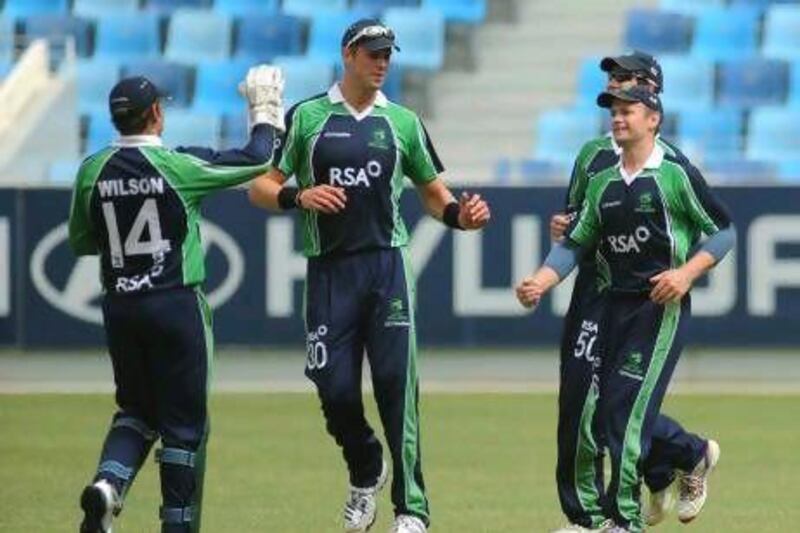DUBAI // William Porterfield, the Ireland captain, says his team have provided their national board with more of the ammunition they need to force through change at the top of the global game.
Ireland secured their passage to a fifth world competition in as many years yesterday, when they thrashed Namibia to qualify for September’s World Twenty20 in Sri Lanka.
And they followed that up by beating Afghanistan with five wickets and seven balls to spare in the final in Dubai last night. The match against Afghanistan was to determine which group they would play in. Ireland will be grouped with Australia and West Indies.
Irish cricket has been living in limbo: too good for this level of the game among the fringe nations, yet not permitted entry into the next.
Even though they and Afghanistan have extended the gap between themselves and the rest of the world beyond the Test sphere, they are still no nearer to being accepted in to the established elite of 10 Test-playing nations.
Two years ago, Warren Deutrom, the chief executive of Cricket Ireland, said they were pushing against “a glass ceiling” and were being excluded from the “cosy club” of full Test members.
On the evidence of this tournament, that glass ceiling now has so many fissures, it is about to shatter all over the floor of the ICC offices in Dubai Sports City.
“We want to get to the stage where we have full member status, or at least have automatic qualification into these tournaments,” Porterfield said after Ireland’s win over Namibia yesterday.
“That is beyond our control and I know that Warren Deutrom and the board back at home have done an excellent job.
“They are pushing for everything and we know we have to keep performing on the pitch to give them the ammunition to go into meetings with.”
The manner in which Ireland clinched qualification for the Sri Lanka event was telling of the fact they have outgrown this level of the game. In their first preliminary final, they beat Canada by 10 wickets with 63 balls to spare. Then, in their final eliminator, against Namibia, they won by nine wickets with 59 balls to spare.
Their final against Afghanistan last night was a rematch of the same fixture two years earlier. No one looks close to breaking their duopoly in the 20-over format at this level.
“These two teams are excellent when the pressure is on, on the big stage,” said Tim Anderson, the ICC’s global development manager. “The reason they have done that is the experience they have from playing at World Cups, and in Afghanistan’s case, against Pakistan in front of thousands of fans in Sharjah.”
Anderson acknowledged it will be difficult to shoehorn many more matches for the best of the rest against the top nations in to the current playing agenda, given that the schedule is already so crowded.
Porterfield is already targeting a few more big scalps – such as those they earned of Pakistan in 2007 and England last year – in Sri Lanka, as his side continually strive to prove their worth.
“In the past two World Cups people have really been taking notice of the steps Irish cricket has been making,” the captain said.
“It is not going to be easy in terms of making that step up, but we are ready for it.
“We are getting even more depth in the squad and outside the squad. As long as we can keep that pool of players getting bigger and bigger we can compete at all levels. Hopefully, the ICC can give us that opportunity, sooner rather than later.”
Namibia’s third-placed finish at this competition was not enough for a place at the global showpiece, but the game’s administrators are considering a proposal to expand the World Twenty20 by the time of the 2014 edition, in Bangladesh.
“Personally, I feel more teams should be given the chance to play against the best,” Sarel Burger, Namibia’s captain, said.
“You come third but you don’t get a chance to play against the best in the world.
"There must be ways they can implement to give smaller teams like ourselves the chance to show ourselves at the top level."
pradley@thenational.ae
How they finished:
1 Ireland
2 Afghanistan
3 Namibia
4 Netherlands
5 Scotland
6 Canada
7 Nepal
8 Papua New Guinea
9 Kenya
10 Italy
11 Hong Kong
12 USA
13 Bermuda
14 Uganda
15 Oman
16 Denmark






